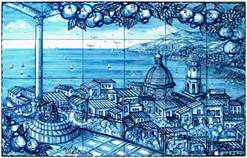Speaker
Ms
Anush Vardanyan
(Institute of Hydroponics Problems, National Academy of Sciences, Republic of Armenia)
Description
Contamination of environment by various wastes from industries, transports, agriculture and nuclear power stations is an actual subject for comprehensive study. Constantly, numerous radionuclides (RN) penetrate in the nature and accumulate extensively by plants and through ecological chain soil-plant-animal-human inpour into biogeochemical circulation resulting in their undesireable accumulation in the organism.
The investigations were conducted in Ararat Valley which is in the zone of technogenic tension with radius of 30 km from Armenian Nuclear Power Station. During the research was studied the accumulation of artificial (90Sr, 137Cs) and natural (U) RN in aerial flowering parts of Hypericum (H.) perforatum L. cultured in open air hydroponics. In hydroponic conditions plants were cultivated on volcanic slag and gravel substrates. As control was used plants grown in soil. Pharmacological value of H. perforatum is owing to the rich composition of biologically active compounds (flavonoids, hypericin, pseudohypericin, hyperforin, tannins, etc.) which have antiviral, anticancer, antioxidant, antidepressant, and other properties.
The researches indicated that, at the same radioecological stress, growth conditions have significant influence on accumulation of RN by plants. Medicinal raw material of H. perforatum observed in soil conditions by the content of U, 90Sr and 137Cs exceeded 1.1; 1.1; 1.8 times hydroponic plants on gravel, and 1.1; 1.3; 1 7 times on volcanic slag respectively. The part of 90Sr and 137Cs in total β-activity in hydroponic plants was less compared with soil control: on volcanic slag 1.9 times and on gravel 1.8 times. In hydroponic and soil plants the accumulation of 137Cs exceeded 90Sr, while in control its content was 3.4 times higher. The medicinal raw material obtained from both hydroponic substrates did not show any significant differences by 137Cs content, whereas the content of 90Sr in plants received from gravel 1.2 times exceeded that of volcanic slag.
Consequently, the results of the study indicated that hydroponic plants from ecological aspects are much more pure than soil ones. Nevertheless, all studied variants of medicinal raw materials by the content of controlled artificial RN overall did not exceed the Maximum Allowable Concentration and corresponds to the requirements of international standards. Therefore, for receiving ecologically clean medicinal raw material of H. perforatum the hydroponic culture is more preferable.
Author
Ms
Anush Vardanyan
(Institute of Hydroponics Problems, National Academy of Sciences, Republic of Armenia)
Co-authors
Dr
Elmira Sargsyan
(Institute of Hydroponics Problems, National Academy of Sciences, Republic of Armenia)
Ms
Sona Bulgadaryan
(Institute of Hydroponics Problems, National Academy of Sciences, Republic of Armenia)

